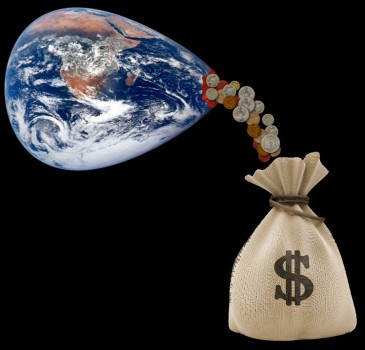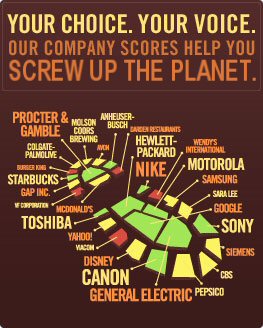
The Climate Group, The Climate Group, The Climate Group…if you say it enough times then it starts to sound familiar: a bit like a business, or the kind of organisation funded by businesses to provide advice to businesses. But is it?
Take a look at some of the web sites and organisations that are waxing lyrical about them:
– John Laumer at Treehugger.com said, of their keynote report: “The most important report you’ll read all year……You’ll not find a better capsule summary of what we face and what needs to be done for the rest of your life – and your childrens’ lives. Honestly. Read the report. The details are gripping.”
– The heads of both Greenpeace UK and Friends of the Earth are happy to be associated with The Climate Group, turning up at events and speaking as one.
– WWF has partnered with The Climate Group on a number of major environmental projects.
Associating and being praised by the great and good within the “environmental movement” (I think those quotes are well earned) is necessary for The Climate Group because they are clearly determined to get things done. Their establishment comes off the back of an urgent need to reverse the appalling state of the atmosphere and other carbon sinks, and they have gone to great efforts to acknowledge the problem and give it the highest possible profile – launching their most significant report with the support of Tony Blair and being highlighted by Ban Ki-moon (United Nations Secretary General) as part of the global solution to climate change.
Regular readers of The Unsuitablog will realise that, while on the surface seeming like significant endorsements, these things really don’t mean as much as they appear; as you will see from this link, this link and this link. Ban Ki-moon went on to say that, “Scientists have given us many tools to make carbon-based fuels cleaner and more efficient, and they are working on many more. At the same time, we are also becoming much better at harnessing the renewable power of the sun, wind and waves. Due in part to these advances, governments, businesses and civil society are all discovering that the move towards a low-carbon economy, far from costing the Earth, can actually save money and invigorate growth.”
Likewise, The Climate Group’s goal is to help government and business set the world economy on the path to a low-carbon, prosperous future.
Now, if you are anything like me then you will straight away see a dichotomy: “low-carbon” is low-carbon; it means not emitting or causing to emit much carbon, which is obviously the only game in town for the next 50 years and more. Then you have “prosperous”, meaning to create financial wealth, and “help government and business” which most certainly sits in the “growing economy” camp. Have you ever heard of a government or business that doesn’t want the economy to grow? Take a look at this (only partial) list of Climate Group Members, a list that is growing all the time, and see if you can find a name that deeply and genuinely wants the planet to return to pre-industrial levels of greenhouse gases:
Arup
Austin Energy
Baker & McKenzie
Barclays Bank
Better Place
Bloomberg
BP
The Province of British Columbia
Broad Air Conditioning
British Sky Broadcasting
British Telecommunications
Cadbury
The State of California
Catalyst Paper
Cathay Pacific
CB Richard Ellis Group, Inc.
The City of Chicago
China Mobile
The Coca-Cola Company
Dell
Deutsche Bank
Dow Chemical
Duke Energy
Florida Power & Light Group
Some stunning names here, and that’s only A-F — leaving out Nestle, Nike, PepsiCo, Tesco and Virgin Atlantic among others.
If all that seemed rather frenetic and complicated, then that is just the appetizer. Wait until you read what is in their report, “In the black: The growth of the low carbon economy”
The climate change cause has turned a corner. It used to be seen only in terms of the costs of action; now, astounding profits and rates of return are catching the eye of entrepreneurs and investors around the world. Almost overnight, an ugly duckling of the world economy has grown into a swan.
Climate change action can bring “astounding profits” for “entrepreneurs and investors”. Can it really?
This is from an article of mine, entitled “If The Economy Doesn’t Shrink, We’re Finished!”
The loudest voices during any kind of economic downturn come from those people who have most benefited materially from economic growth: the urban and suburban rich, the corporate leaders and the political elites who judge the quality of their lives by the size of their house, the size and number of their cars, the expense of their vacations, the amount of consumer goods they own and the number of people they control. To them, recession means the unimaginable prospect of a more frugal and less powerful lifestyle; Economic depression is lifestyle meltdown. If their place in civilized society is threatened then the whole of society must be made to feel their own fears: by exploiting their position in the hierarchical structure, they manufacture a universal fear of Economic contraction. We become scared because they want us to be scared.
There is a clear dichotomy between acting on climate change and benefitting business; so much so that businesses and their serfs in government will do anything to ensure that theirs is the only game in town.
They don’t want to save us — they just want to make money. Don’t let them.












